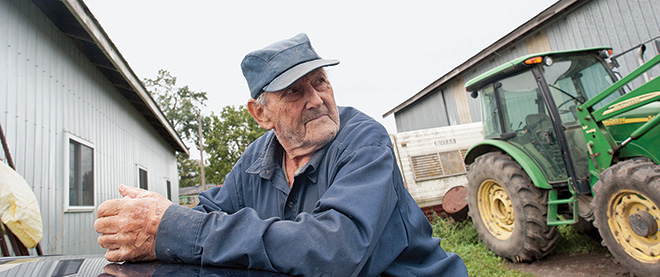The last man standing
After years of fighting to keep his home, Frank Meyers has no choice but to bend to the government’s will
Photo by Cole Garside
Share

Like his legendary forefather, Frank Meyers is not afraid of a good fight. Or a long one. For seven years now, he has been battling the federal government, refusing, at every turn, to part with his beloved family land: 90 hectares of prime soil in Quinte West, Ont., directly north of Canadian Forces Base Trenton. “I’ve lived on this farm for 85 years, worked it all my life, and I don’t know why the government wants to throw us out,” Meyers says, standing near his latest crop of corn. “It’s my heritage. Leave me alone.”
Meyers honestly believed that if he kept refusing to sell, Ottawa would do just that: leave him alone. But the master plan was never in doubt. The Meyers land, and 11 other pieces of property, will soon be transformed into a state-of-the-art, 400-hectare headquarters for Joint Task Force 2, the Canadian military’s elite anti-terrorism squad. And after so many years, so many sleepless nights, it appears Frank Meyers has no choice but to finally surrender. A recent letter from the federal justice department says he must be off the property by Sept. 30 because “demolition crews will be attending the site” on Oct. 1.
“It’s an awful stress on me,” he says, dressed in jeans and a blue shirt. “They’re waiting for me to drop dead. That’s what they want.”
For Maclean’s readers, Meyers’s saga is a familiar one. The direct descendant of Capt. John Walden Meyers, a Loyalist war hero, Frank farms the very same plot of land King George III bestowed on his famous relative for his service during the American Revolution. A giant man with fire-red hair and a knack for infiltrating enemy lines, the captain was, ironically enough, the 18th-century equivalent of a special forces commando. Two hundred years later, some of the stories have morphed into myth (according to one tale, he wore moccasins that were pointy at both ends so his footprints couldn’t be tracked), but historians do agree on one detail: To patriot children, he was the bogeyman. If you don’t behave, their mothers would say, Capt. Meyers “will come and eat you.”
Today, Capt. Meyers is remembered as the founding father of nearby Belleville, where his exploits are engraved on a town plaque: “Meyers was one of many Loyalists whose defeat in war led to the beginnings of a permanent settlement in what is now Ontario.”
In 2006, when federal bureaucrats first started knocking on doors, Frank Meyers dug in for a war of his own, one of numerous owners vowing to fight the air-base expansion and keep their homes. But, as his neighbours weighed their options—sell now, or be expropriated later—they slowly began to cave, one by one. “It was devastating,” one neighbour told Maclean’s in 2009. “But we were in their way. The bottom line is: They’re going to take it, so you have to co-operate.”
Meyers adamantly refused to negotiate, and, in May 2012, Ottawa did the inevitable. The expropriation papers described his land as “absolutely essential for the safety and security of Canada.”
Although the property now officially belongs to the state—and the final selling price is still under negotiation—the Meyers family has been given nearly 18 months to empty their sheds and vacate the land. But, as Oct. 1 looms large, they still aren’t willing to concede defeat. “We always hold out hope that we’ll be able to keep the property and continue on with what we’ve been doing all our lives,” says Frank’s son, John. “I don’t think we’ll ever give up until we are absolutely out.”
Rick Norlock, the local Conservative MP, says he sympathizes with the family. He understands their connection to the land, and why they didn’t want to sell—at any price. But the base expansion, he says, will inject millions of dollars and thousands of jobs into an economically depressed region that desperately needs it. “Nobody is happy in scenarios like this,” Norlock says, sitting in his Cobourg office, a 40-minute drive from the Meyers farm. “Everybody would like the world to remain the way it is for them and for their families forever, but the reality is there is an Air Force base there. There was a decision to expand it. It is good for the area. It is not good for a couple of people.”
When Norlock was first elected in 2006, he campaigned on a promise to bring more troops to CFB Trenton. He made the same promise when he was re-elected in 2008 and again in 2011. “The vast majority of my constituents want this to go ahead sooner rather than later,” he says. “I’m going to be frank with you: I’m at the point where I’m saying, enough is enough already. Let’s get this training facility built and let’s get JTF-2 here.”
In fact, Norlock says the government would have expropriated the Meyers land much sooner, had it not been for Stephen Harper. “I was anxious for this to go ahead, and the Prime Minister convinced me that we need to be more conciliatory; we need to try and do this the right way,” he says.
But any patience the Prime Minister had has long expired and, as the final deadline approaches, Frank Meyers doesn’t want to talk about what might happen when the sun rises on Oct. 1. “I have no idea,” he says. “What I do, I’ll never tell, until the day comes.”